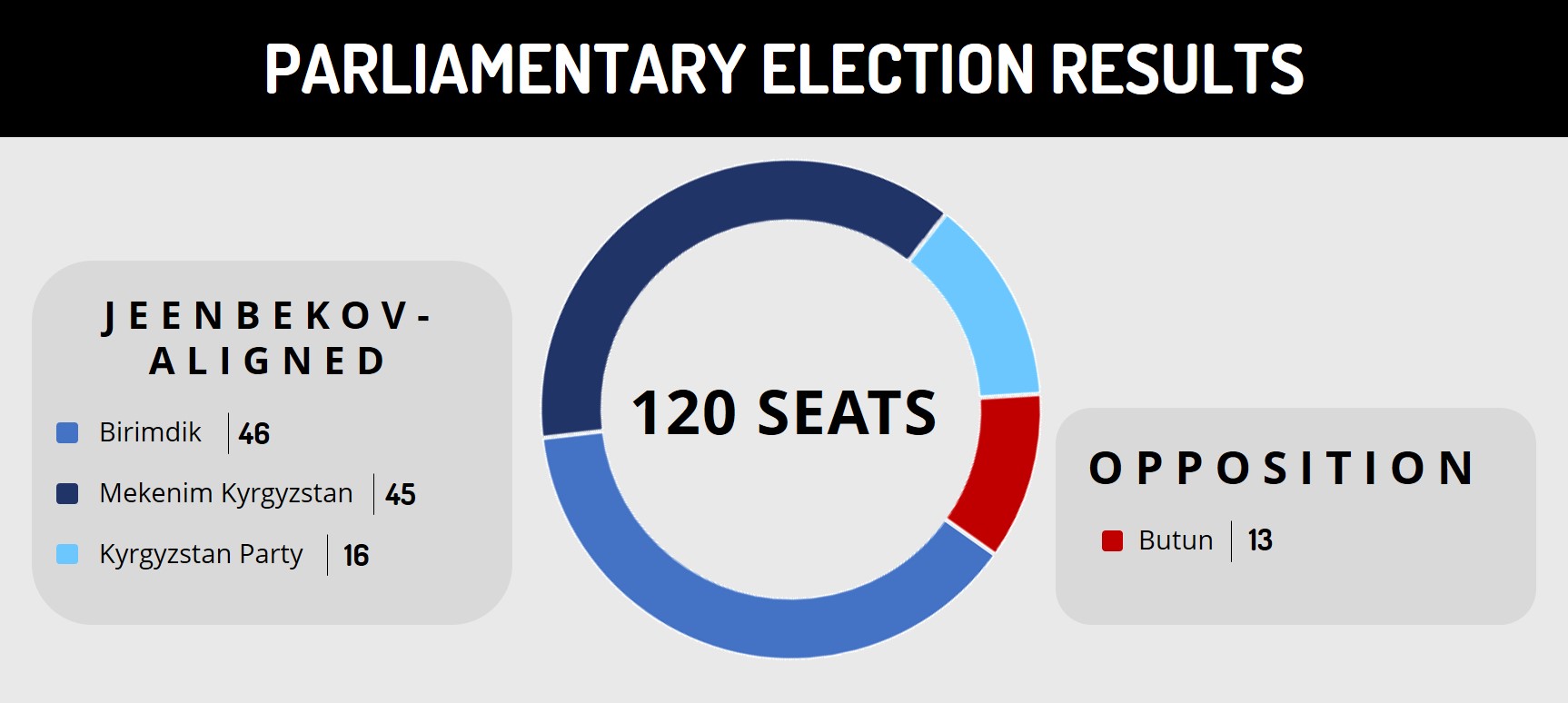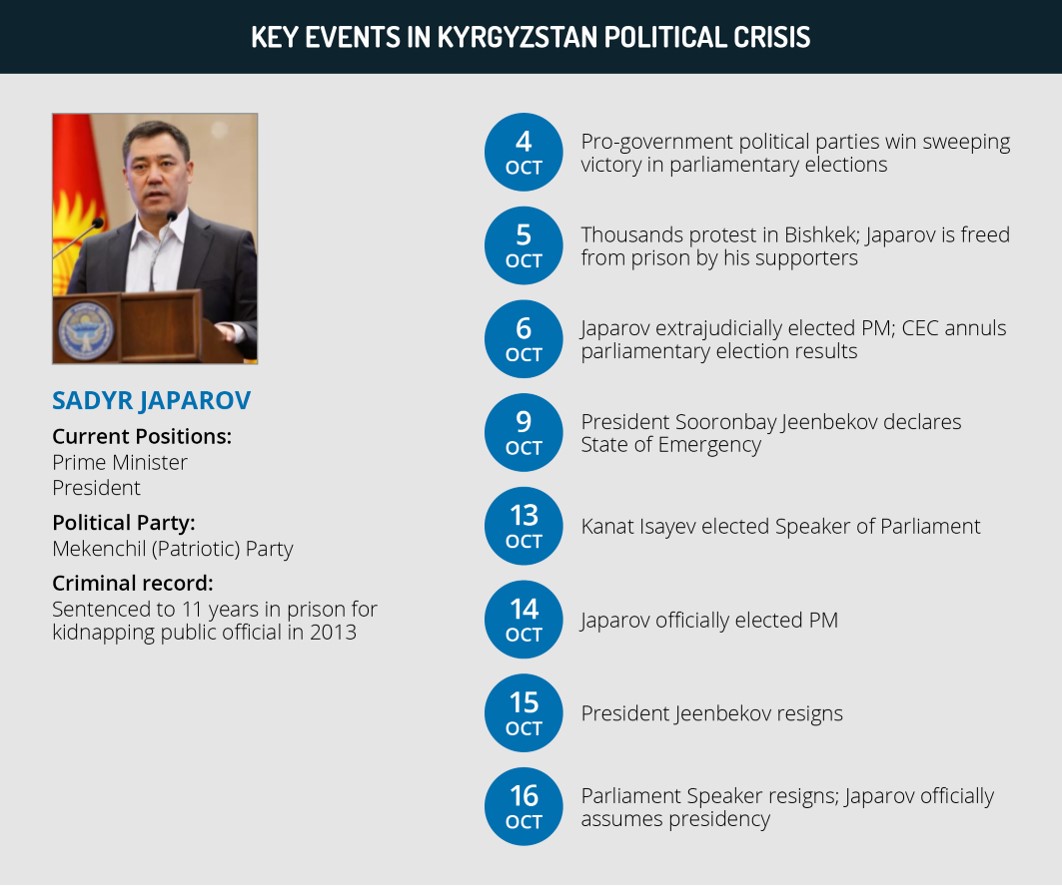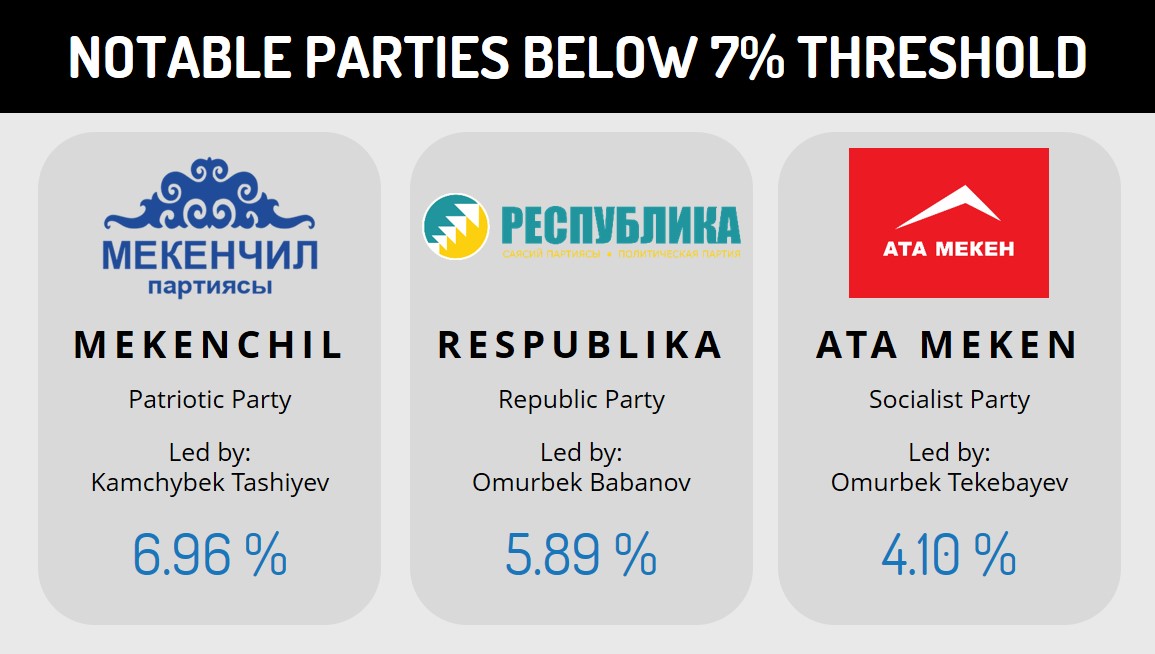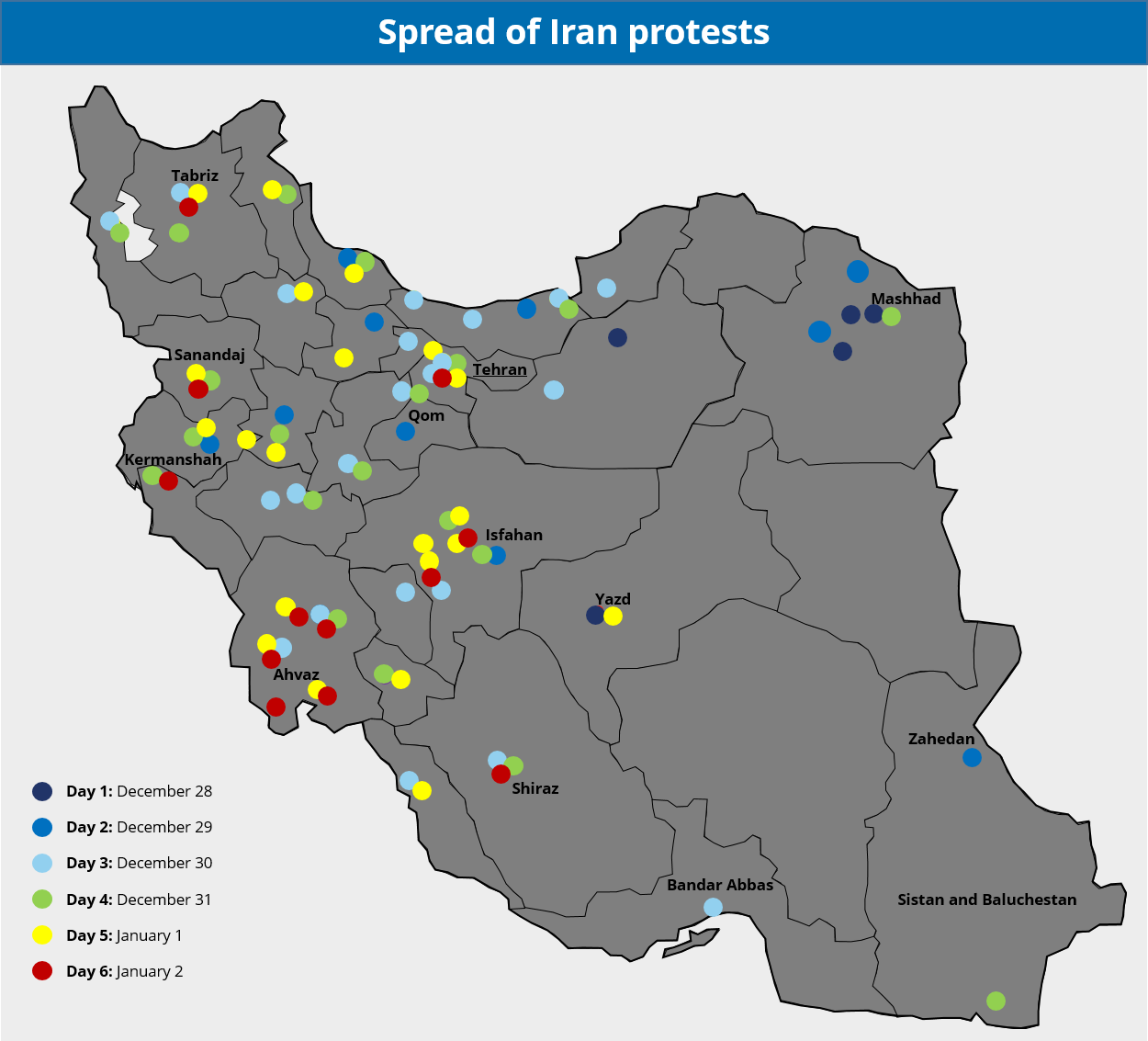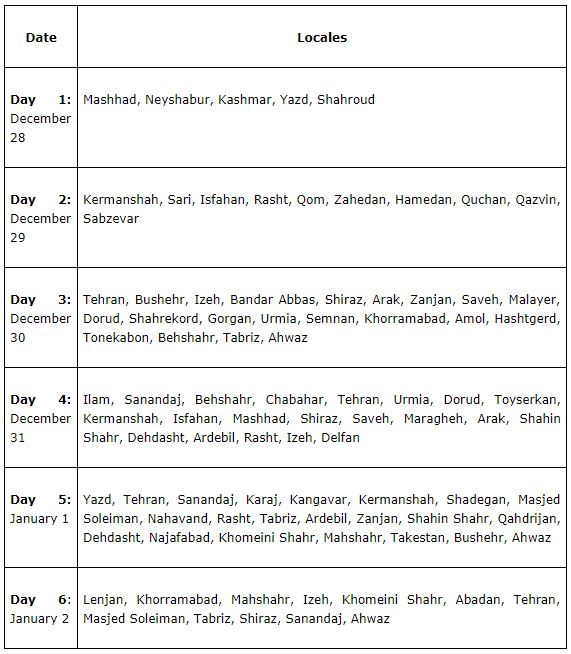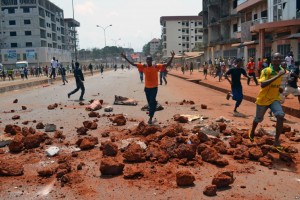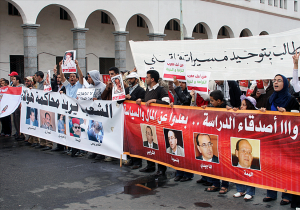This report was written by Danielle Levi – Senior Analyst for Central & South Asia
And edited by Ollie Wiltshire – Regional Director, Asia-Pacific
Executive Summary:
Unrest erupted across Kyrgyzstan in response to the October 4 parliamentary elections, which were marred by allegations of fraud and vote-buying by parties aligned with the government.
Protests continued even after the annulment of the election results on October 6, informed by widespread discontent over the government’s inaction to corruption allegations, prompting then-President Jeenbekov to resign.
The anti-corruption platform and strong mobilization capabilities of newly incumbent leader Japarov bolstered his quick ascension to power within days of being freed from jail by his supporters.
However, opposition to Japarov’s rule and the risk of civil unrest will remain high in the medium term, particularly over the leader’s push for constitutional reforms and the possibility of a further consolidation of power in his favor, though the political transition is unlikely to affect the country’s foreign policy.
Japarov may seek to renegotiate the terms of prior agreements with foreign-owned mining companies or pursue tougher regulations on operations and is further liable to continue harsh rhetoric against such companies ahead of upcoming polls, increasing the risk of vandalism against mining sites and offices.
Travel to Kyrgyzstan can continue while adhering to security precautions regarding protests, civil unrest amid the ongoing political instability.
Current situation:
On October 4, Kyrgyzstan held elections for its 120-member unicameral Parliament, called the Supreme Council or the Jogorku Kenesh in Kyrgyz. 16 political parties contested the polls, of which a total of four passed the necessary seven percent threshold to enter Parliament.
Following the announcement of the results, massive protests erupted across the country, including in Bishkek, to denounce the electoral process due to widespread allegations of fraud. Protests quickly escalated, with hundreds of demonstrators storming government buildings and offices. Instances of vandalism were also recorded across the country, including against offices and facilities of foreign-owned mining companies.
During the chaos, protesters freed several prominent political leaders from prison, including former President Almazbek Atambayev and Sadyr Japarov of the Mekenchil party. The latter was serving an 11.5-year sentence for kidnapping a government official in 2013 and, immediately after his release, declared himself the country’s new Prime Minister during an address in front of his supporters.
The Central Election Committee quickly annulled the parliamentary elections on October 6, urging for new polls to be held in the coming months. Despite the annulment, protests continued, prompting then-President Soornobay Jeenbekov to declare a state of emergency on October 9.
The new regulation, however, did little to quell protesters, who increasingly converged behind Japarov. During an extrajudicial parliamentary session held on October 10, Japarov was elected as the new PM before being formally appointed on October 14.
Meanwhile, Japarov’s supporters called for the resignation of President Jeenbekov and Parliament Speaker Kanat Isayev from the Kyrgyzstan Party, who had been elected to his post a few days prior. Both ended up officially notifying the Parliament of their resignations on October 16, following which the powers of the presidency were transferred to PM Japarov.
On October 22, following the Parliament’s approval, acting President Japarov signed changes to election laws, approving a delay in parliamentary elections until June 2021 instead of the initial December 20 deadline. The move was reportedly set to allow the drafting of new electoral laws, which must be completed by January 21. PM Japarov has advocated to decrease the number of seats in the Parliament and to alter the electoral system to strengthen the powers of the presidency, among others.
Meanwhile, presidential elections have been scheduled for January 10, 2021. Currently, a law prohibits the acting president from presenting himself as a candidate. However, acting President Japarov announced on October 26 that he will step down from his position in December to become eligible to run in the following month.
In a separate development, the former deputy chairperson of the State Customs Raiymek Matraimov was briefly detained on October 20. Matraimov is at the center of the biggest money-laundering scandal in the country and is accused of having established a corruption scheme through border smuggling. Following his arrest, a judge ruled to immediately release Matraimov and hold him under house arrest, while authorities stated that the official will be paying back approximately 24 million USD in damages to the state.
Background:
Since Kyrgyzstan’s independence following the collapse of the Soviet Union in 1991, the country has been marked by political turmoil and civil unrest that resulted in regime changes in 2005 and 2010. These two popular uproars were largely led by the country’s elites and marked a clash between competing networks of politics, business, and criminal groups.
In 2005, in the wake of a disputed parliamentary election, during which opposition candidates were barred from contesting and amid widespread discontent over allegations of corruption within the incumbent government, protests erupted against the then-President Askar Akayev, who, after weeks of unrest, fled the country and later resigned.
Kurmanbek Bakiyev was then appointed PM and interim President, before being elected President in the July 2005 presidential elections with nearly 89 percent of the vote. However, during his rule, Bakiyev faced widespread accusations of corruption and nepotism.
In early 2010, violent protests erupted across the country over rising utility prices and government repression, and at least 80 individuals were killed and hundreds injured during clashes between law enforcement and protesters in the capital. After weeks of unrest, Bakiyev resigned and fled to Belarus. In the aftermath of the anti-government unrest, inter-ethnic clashes between Uzbek and Kyrgyz residents also broke out in the southern city of Osh and Jalal-Abad.
Following Bakiyev’s removal, a constitutional referendum was held under the interim administration of Roza Otunbayeva, transforming Kyrgyzstan from a presidential system to a parliamentary republic. Later on October 10, 2010, parliamentary elections were held under the new regulations, during which the pro-Bakiyev party Ata-Zurth, led by Kamchybek Tashiyev and to which Japarov belonged, won a majority of seats. The party had largely advocated reversing the new laws. After weeks of negotiations, a coalition was formed with the Social Democratic Party of Kyrgyzstan, the Respublika Party, and the Ata-Zurth Party, following which Almazbek Atambayev was elected PM.
Atambayev later resigned from his post of PM and was elected President for a seven-year term during the presidential elections in October 2011. During his rule, Atambayev passed constitutional amendments shifting powers from the president to the prime minister.
In 2017, Sooronbay Jeenbekov, Atambayev’s former PM and ally, won the presidential elections. Relations between the two politicians soured during Jeenbekov’s rule. Atambayev was arrested in 2019 based on several charges, including “organizing mass unrest.
Assessments & Forecast:
Widespread discontent over government’s inaction on corruption allegations precursor to civil unrest
Similar to 2005 and 2010, the latest unrest in Kyrgyzstan appears to have been largely triggered by widespread discontent with the country’s ruling elite due to accusations of corruption within the incumbent administration. These grievances were already evident in late 2019, during which large demonstrations were held in Bishkek following the publication of a report by a group of media outlets accusing former deputy chairperson of the State Customs Raiymbek Matraimov of establishing a major corruption scheme.
While allegations of corruption against the influential Matraimov had already been levied in previous years, the large attendance at the protests in late 2019 pointed to growing public frustrations over the government’s perceived failure to carry out a credible investigation into the corruption allegations. The government’s perceived inaction following the killing of a key source in the Matraimov investigation in November 2019 in Turkey may have also lent credence to claims issued by anti-corruption activists that Matraimov was working with the Jeenbekov administration.
In the wake of parliamentary elections, public frustration further grew amid reports of a massive vote-buying operation committed by parties close to the government – allegations that President Jeenbekov denied. These reports of fraud largely informed the widespread rejection of the results on October 4 that saw only four out of the 16 parties contesting past the necessary threshold to enter the Parliament, of which three were closely associated with President Jeenbekov. Additionally, the fact that the My Homeland (Mekenim) Kyrgyzstan party, believed to be closely associated with Matraimov, won 45 out of the 120 seats likely cemented the perception of nepotism within the government, which in turn catalyzed the large-scale unrest of October 2020.
Japarov’s anti-corruption platform & strong mobilization capabilities bolstered his ascension to power
Japarov’s ascension to power is highly notable given his swift ability to secure the positions of both PM and President following his liberation from prison on October 5-6. Despite his claim that the transition of power was done peacefully, his rise appears largely bolstered by his widespread mobilization capabilities, which have been displayed in Bishkek repeatedly during the current wave of unrest. His supporters demonstrated a willingness to disobey public orders and employ intimidation tactics, such as threatening rival political leaders, including Jeenbekov, and storming government buildings, which later inflamed allegations that Japarov was assisted by criminal organizations. These tactics used by Japarov’s supporters rendered the authorities’ efforts to avoid violently dispersing his crowd ineffective and thus partly ensured the current leader’s rise.
Japarov seemed to enjoy a well-organized support base that he was able to swiftly mobilize through social media platforms and instant messaging applications. His public notoriety appears to have been largely built during his anti-government activities in 2012-2013 against a Canadian-owned gold mine, during which he initiated large-scale protests in Bishkek and Kararol, located in the Issyk-Kul Region. His advocacy in supporting the nationalization of the gold mine appears to be at the core of his popular support, given that opposition to the privatization of key state assets was a central public issue during the 2010 unrest.
Meanwhile, Japarov’s anti-corruption platform, at which he hinted during a speech made on October 8 warning that Matraimov would be detained once he was elected to power, further boosted his public support. This is given widespread discontent over the corruption allegations of Jeenbekov’s administration. His limited experience in government combined with his work as part of the National Agency for the Prevention of Corruption from 2008-2011 allowed him to capitalize on the current wave of dissatisfaction and project himself as an outsider to the allegedly corrupt political elite.
Opposition to Japarov’s rule & risk of civil unrest remains high over medium term
In the immediate term, Japarov’s rise to power will diminish unrest in Bishkek, evidenced by the Parliament’s withdrawal of the state of emergency on October 18. However, challenges to Japarov’s rule are likely to persist, making political stability unlikely in the medium term.
This opposition will likely focus on legally countering Japarov’s push to reform the Constitution, particularly with regard to the presidency. Specifically, several opposition leaders are expected to oppose Japarov’s efforts to afford more power to the presidential office. This was already demonstrated by a statement made on October 22 by the opposition Ata Meken party, stressing that the parliamentary system must be preserved and that the president’s authority should be decreased. Ata Meken party, nonetheless, voted in favor of postponing the parliamentary election to enable a change of the Constitution on October 22, due to a proposed clause supporting a decrease in the threshold necessary to enter the Parliament, among others, which will directly benefit many opposition parties. FORECAST: In this context, the debate over constitutional changes, including the form that the government ought to take, is expected to be at the center of political tensions in the coming term. This is liable to trigger new waves of protests in the coming months, though such pushback will likely become more apparent closer to Presidential elections slated for January 10 and January 21, when the constitutional reforms must be completed.
Meanwhile, Acting President Japarov’s appointments of key public leaders may also trigger opposition to his rule if they are deemed to follow similar patterns of corruption allegedly seen in the previous administrations. The appointment on October 16 of his long-time ally Kamchybek Tashiyev to the post of Chairperson of the State Committee for National Security (SCNS), the national agency responsible for intelligence on counterterrorism and organized crime, may lead to such concerns. This especially given that the agency is tasked with arresting political leaders accused of corruption and could be viewed as Japarov using a long-time ally to shield himself from criminal scrutiny. Concerns may also spike over the appointment of politicians closely associated with former President Kurmanbek Bakiyev, who Japarov supported in the past, given that the Bakiyev was deposed in 2010 through popular protests.
FORECAST: In this context, Japarov is expected to double his effort to project himself as a legitimate political leader in an attempt to counter allegations that he is associated with criminal networks and concerns over his rise to power on the back of intimidation tactics. These efforts were already evidenced by the brief arrest of Raimbek Matraimov on October 20, aimed to cement Japarov’s image as an anti-corruption champion.
However, while Matraimov’s arrest is notable, given his reputation of being a “kingmaker” in Kyrgyzstan, it will only fully cement Japarov’s position as an anti-corruption platform if a credible investigation is carried out into Matraimov’s family. FORECAST: However, this remains highly unlikely, based on Matraimov’s swift release and the announcement that he would pay approximately 2 million USD to the state, suggesting a deal was quickly cut. Furthermore, Japarov’s announcement on October 21 stating that any former officials who illegally enriched themselves through corruption would be able to voluntarily reimburse the state and receive “economic amnesty” will further cast a doubt on the leader’s strong anti-corruption credentials.
Kyrgyzstan’s political transition unlikely to affect country’s foreign policy
Similar to the 2005 and the 2010 regime changes, recent events are unlikely to bring a notable change to Bishkek’s foreign policy. Japarov will attempt to project an image of stability to his international counterparts while highlighting his respect for the country’s democratic institutions and laws. This is likely to be done in an effort to push back on the EU’s statement of concern with Japarov’s rise to power and the US’ statement criticizing “attempts by organized crime groups to exert influence over politics and elections.” These efforts were already witnessed on October 22 with the detention of notorious crime boss Kamchy Kolbayev, for whom the US Department of State’s Transnational Organized Crime Rewards Program had offered a reward linked to information leading to the disruption of the financial mechanism of his criminal network. The US Embassy in Bishkek issued a statement welcoming the detention.
Meanwhile, China’s relatively muted reaction, which mostly consisted of a brief statement issued by the Foreign Ministry expressing concern, is notable, given Beijing’s major investments in Kyrgyzstan. However, its reaction falls in line with its general policy of refraining from interfering in the domestic affairs of a foreign country. FORECAST: Now that Japarov consolidated power, Chinese officials are expected to engage with Kyrgyz officials to ensure the security of their economic interests, including gold mines, given that these infrastructures have been the target of vandalism during the recent turmoil. Chinese officials are also likely to attempt to strengthen China’s economic cooperation with the new government, given that the previous administration had backed down from supporting Chinese-funded projects following public protests. However, due to Kyrgyzstan’s prolonged political instability, Beijing’s difficulties in carrying out projects with Bishkek are liable to persist. Nevertheless, given that China owns a substantial part of Kyrgyzstan’s debt, Japarov is unlikely to seek a confrontation with his Chinese counterparts.
Russia’s reaction to the crisis has been similarly restricted, pointing to its relative indifference to who remains in power. This is underscored by the meeting held between the then-President Jeenbekov, Japarov, and Russia’s Deputy Minister for post-Soviet integration, Dmitry Kozak, on October 12, which illustrated Moscow’s willingness to engage with all parties. This was likely informed by perceptions that a regime change in Kyrgyzstan was unlikely to bring anti-Russia forces to power, given that most Kyrgyz political actors have strong ties to the Kremlin and due to the large support for Russia among Kyrgyzstan’s population. Nonetheless, Russia remains highly concerned with the political stability of former Soviet countries, and the withdrawal of its financial assistance to Bishkek on October 15 was likely aimed at pressuring Kyrgyzstan’s ruling elite into finding a swift resolution to the current crisis. FORECAST: In the coming term, Kyrgyz-Russian relations are expected to remain strong. This was already evidenced by the Kyrgyz Foreign Minister’s statement on October 25 saying that the country was willing to consider expanding Russia’s airbase in Kant in the Ysyk-Ata District of Chuy Region and Japarov’s plan to conduct his first foreign visit to Russia.
Japarov likely to continue harsh rhetoric against foreign-owned gold mining companies ahead of upcoming polls, increasing risks of vandalism
During the recent political unrest, several English, Canadian, Russian and Chinese-owned mines were attacked across the country, pointing to the public’s high discontent with foreign-owned mining operations, which are widely perceived to be benefiting from Kyrgyztan’s natural resources at the expense of the local population and damaging the country’s environment. Due to Japarov’s past experience in organizing protests to nationalize the Canadian-owned Kumtor gold mine in 2012-2013, the leader is expected to step up rhetoric against foreign-owned mines over the coming months in an effort to boost his support. This effort will likely be integrated into his anti-corruption platform, given that the Kumtor gold mine has recurrently been at the center of corruption scandals in the country.
Despite the rhetoric, Japarov appears to have softened his attitude towards Kumtor in terms of actual action, evidenced by statements on October 22 claiming that the nationalization of the gold mine was not relevant in 2020. This placatory approach is largely thought to be informed by the Canadian company’s substantial contribution to Kyrgyzstan’s economy, accounting for approximately 10 percent of the country’s total Gross Domestic Product (GDP).
Rather, the acting leader is liable to seek a renegotiation of the terms of the Kumtor agreement as well as speak about pursuing tougher regulations on gold mining. Such measures may exceed the Jeenbekov administration’s efforts to increase tax rates for the mining industry, which raised taxes by seven percent from November 1 and 10 percent starting 2023.
Meanwhile, in the event that Japarov uses populist rhetoric against foreign-owned mines, this will increase the risks of vandalism against mines and offices of gold-mine extraction companies, particularly in the run-up to the elections. Moreover, instances of unrest relating to political developments in Bishkek also increase the risks of vandalism against foreign-owned interests. Finally, the difficulties faced by law enforcement to prevent instances of looting highlight the subpar security conditions in Kyrgyzstan, which are unlikely to improve in the coming term.
Recommendations
Travel to Kyrgyzstan may continue at this time while adhering to standard security protocols given the latent threat of crime and violent civil unrest.
Those operating or residing in Kyrgyzstan are advised to maintain heightened vigilance due to the risk of unrest resulting from the current political instability and ahead of the upcoming parliamentary and presidential polls.
Individuals in the country are advised to maintain awareness of important political developments and avoid all protests, political rallies, and large gatherings, due to the risk of being involved in violent clashes between demonstrators and security forces or counter-protesters.
